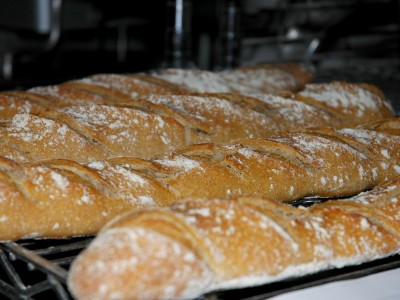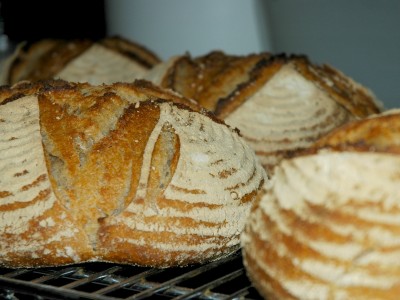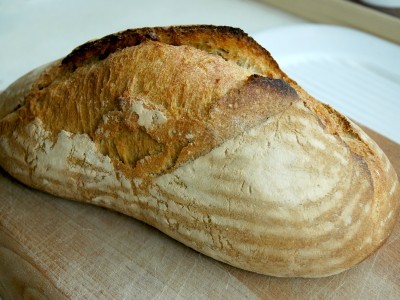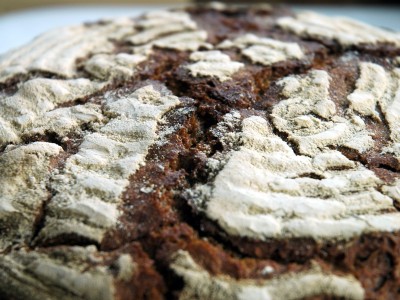Sourdough breadmaking course with the Handmade Bakery
Yesterday John and I went on a baking course run by the Handmade Bakery.
We met Dan & Johanna, who run the bakery and the course, on a wild food walk in May last year. At the end of the walk, we ate their bread alongside the crayfish we’d caught, our foraged greens & battered sweet cicely dusted with icing sugar. Next to the river at Barden, just north of Bolton Abbey, in the glorious sunshine, the meal was a delight. It was also the first time we’d tried any type of proper slow fermented bread and it’s what inspired us to make our own slow rise bread. Before and since then though, I’d failed to manage to maintain a sourdough starter so I saw the benefit of doing a course with them to learn more about that sort of thing so in July last year, I booked us on the next available sourdough course (their “rising ambition” course – now seems to have been replaced by a “wild yeast” one) – yesterday. It was well worth the wait.
We arrived to tea, coffee & delicious pulla, specifically cinnamon rolls called korvapuusti. But we didn’t get to sit around for too long – not when there was baking to be done!
Over the course of the day, we made four loaves each – a round boule & baguette from a slow fermented wheat dough (pain de campagne) they’d mixed the day before (for us to learn about shaping), a sourdough baton made from a build (a thick starter), and a free-standing 100% rye sourdough with figs & aniseed.
The pain de campagne allowed us to learn different shaping techniques – demystifying baguettes, although I’m going to French breadmaking hell because I did nine gashes on my baguette rather than seven. John & I both went for cross-shaped slashes on the top of our boules (John’s is the one in focus below – he didn’t slash deeply enough at first) but other people went for two straight slashes and another four small ones around the edges — they all looked very pretty and we’ll definitely try some variations in the future.
The sourdough from a build allowed us to practise mixing & kneading without having to wait 12 hours – they mixed up the build, using a rye starter, the previous day. After sufficient rising, most people folded in additional flavourings – either olive, lemon & thyme or walnut & raisin – but I left my plain so we could see the contrast. Presumably because it didn’t have the extra bits in it weighing it down, mine rose beautifully.
Shaping them for the baton (proving in an oblong proving bowl then baked free-standing) was another good skill to learn – especially as we bought an oblong proving bowl to use at home.
After making a 100% wheat bread using a wheat starter (the pain de campagne) and a wheat bread with a rye starter (the sourdough from a rye build), we then made a 100% rye bread from a rye starter. It felt a lot more akin to making a cake or soda bread as it wasn’t kneaded – more mixed together and shaped like soggy clay – but it was left to rise in the same was as normal. It was baked free-standing and ended up a lot flatter than the boule, even though they’d been shaped in the same round proving bowls — this is apparently expected and not us being rubbish :)
We haven’t tried the 100% rye loaves yet – we were advised to leave them overnight before trying them as the close crumb can be “gummy” on the first day – but we’ve tried the pain de campagne and John’s had his sourdough with raisin & walnuts. The slow fermented pain de campagne is much more noticeably sour compared to the one made from build. Both are quite chewy with tough crusts – not disagreeably so but certainly not the fluffy barely-there bread that passes for “artisan” bread in supermarkets. In fact, we found both facets reassuring as our slow rise bread has similar qualities and now we know that’s not a sign that we’re doing something wrong.
In addition to the eight (!) loaves we brought home between us (two were very quickly gifted to John’s mum & dad, who had Lily sat during the day), we were also given portions of starter so we can make our own sourdough. The wheat leaven, which is apparently a little harder to maintain so we’re not sure we’ll be able to keep ours going, was started in River Cottage in 2005 but the rye leaven came to the Handmade Bakery via the Phoenix Bakery in Weymouth but apparently originated in Russia in the 1970s so is older than we are :)
All in all, the day wasn’t cheap but was well worth it in our opinion – we learnt new skills and gained so much bready knowledge – Dan & Johanna are very knowledgeable and very keen to share. They also provided a lovely lunch – an Iranian minestrone soup with local cheese and their bread (naturally), followed by chocolate cake made from waste sourdough leaven. We’d heartily recommend it.
Read More






